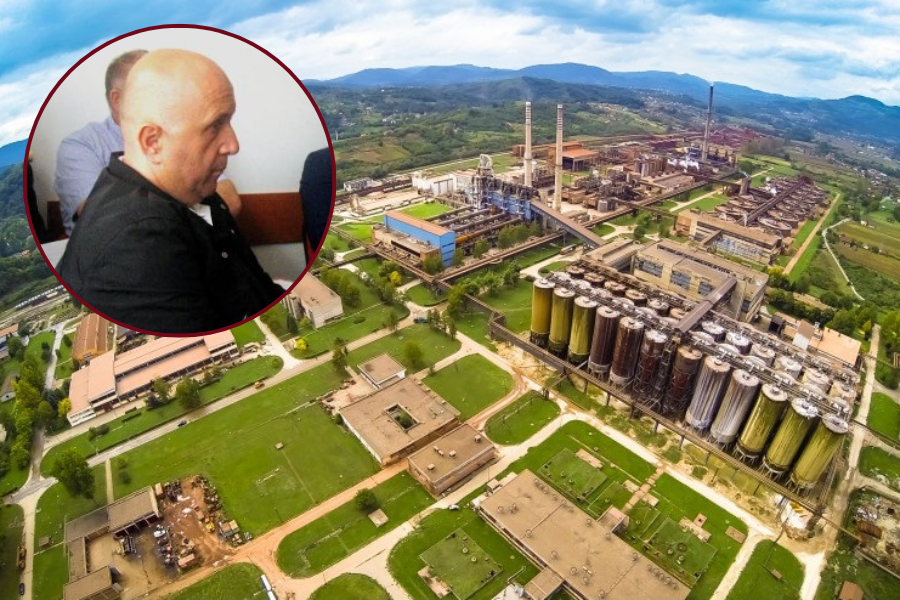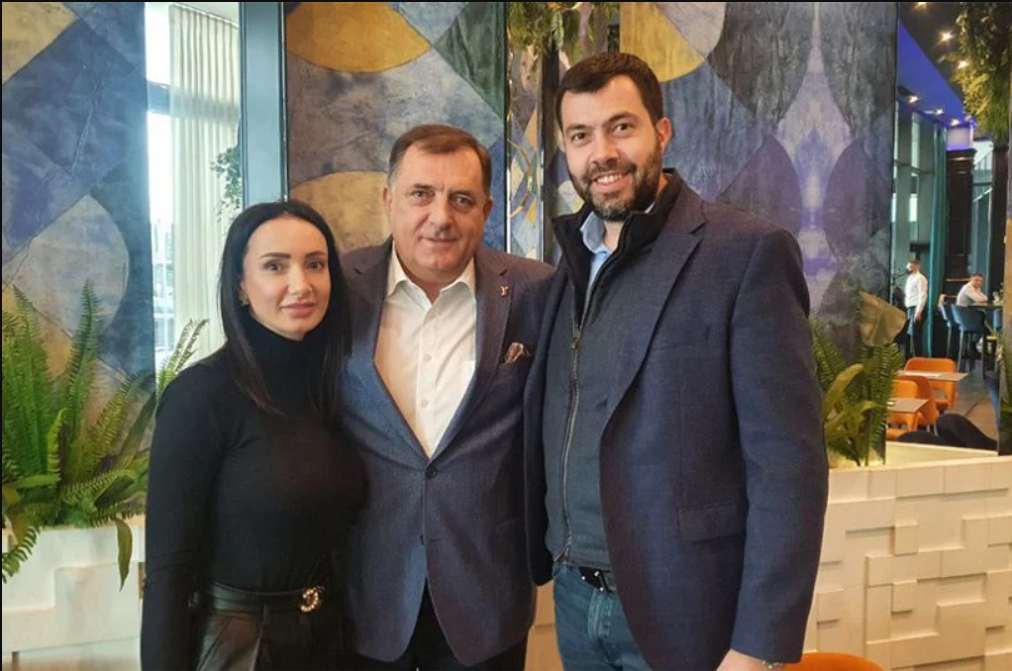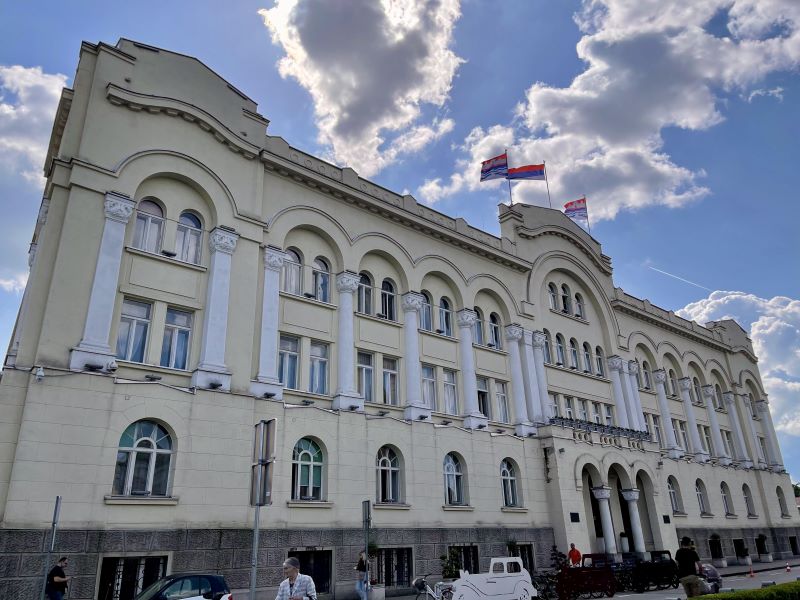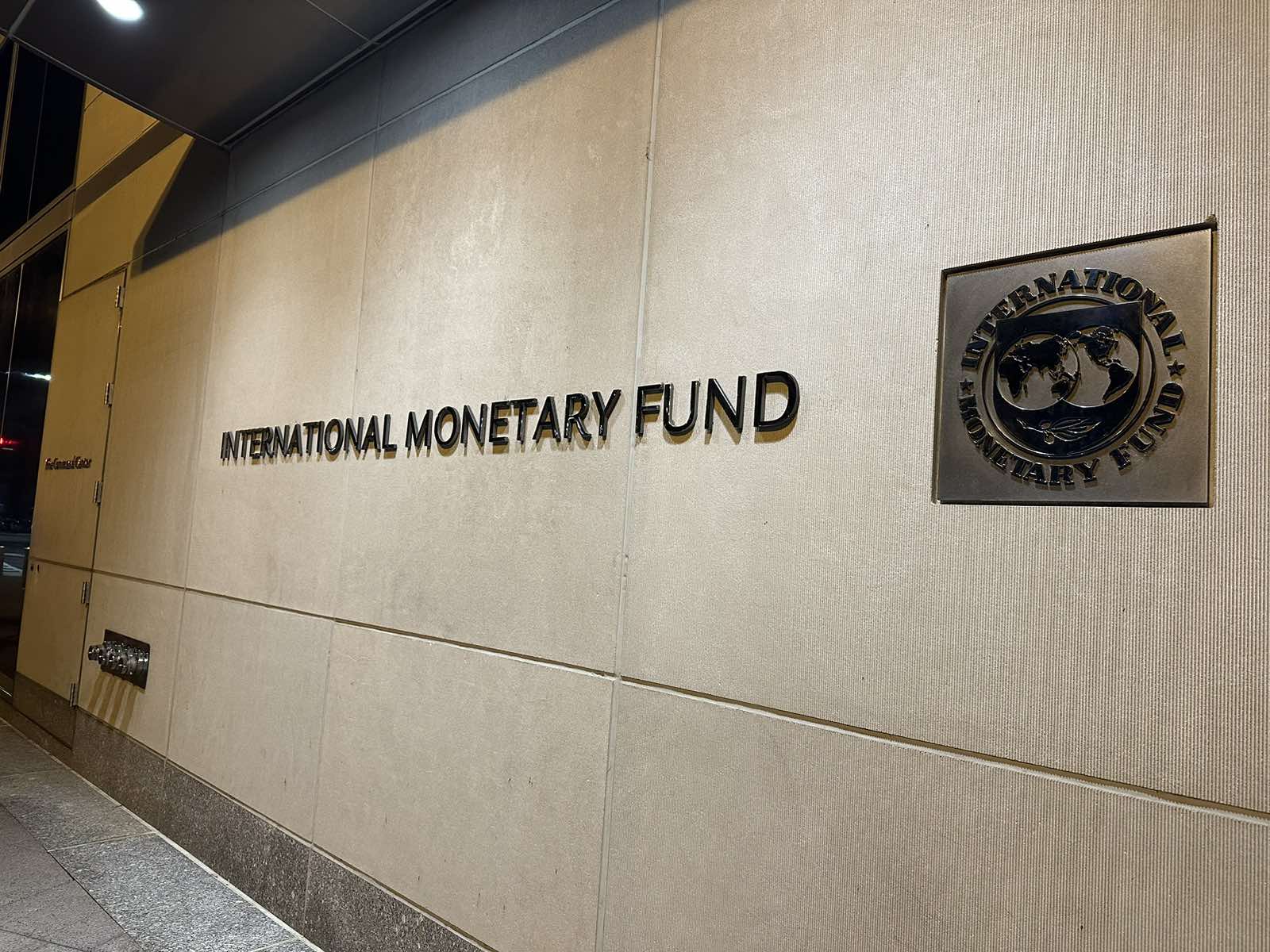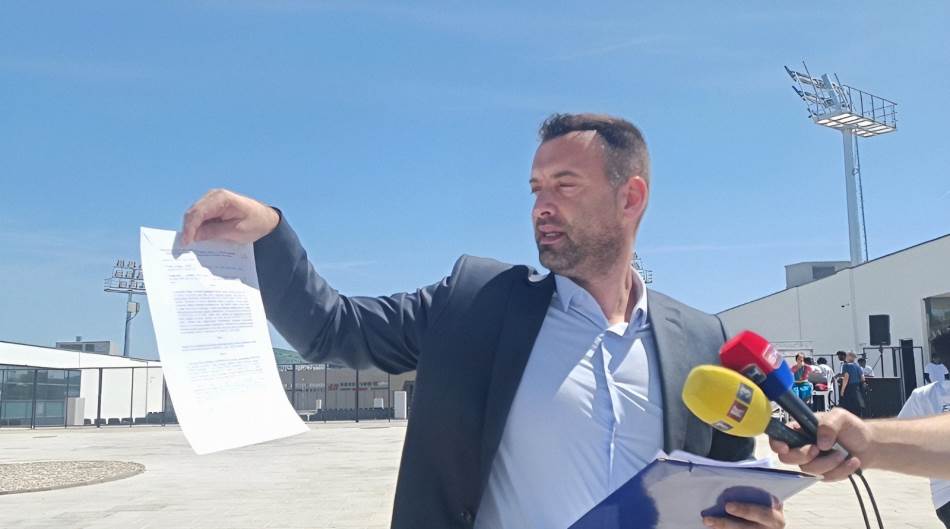From the SDP to Block 7: New Government Leadership of the FBiH Without Answers to Questions About the Largest Chinese Project in FBiH
03.07.2023. / 12:47
SARAJEVO – The construction project of Block 7 has been on hold for 17 years, during which only preparatory work has been carried out at the planned site. This investment has cost the citizens 233 million KM so far, and the new Government of FBiH and the relevant ministry have no answer to whether this project will continue. It remains to be seen whether the SDP Minister of Energy, Mining, and Industry shares the views on dealing with the Chinese, like his party colleague Grabovica, under whose tenure EP BiH signed a cooperation agreement.
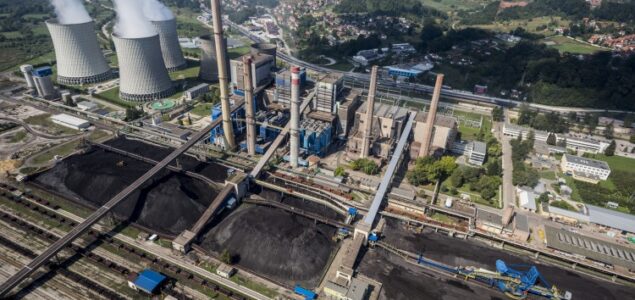
FOTO: Tacno.net
The new composition of the FBiH Government was formed in late April 2023, and it faces many unresolved issues. One of the key questions is the construction project of Block 7. This multimillion-dollar project, estimated to be worth 750 million euros, which is now entering its 17th year of waiting, should be at the top of the priority list for resolution considering the huge amount of money invested and years of planning. However, neither the FBiH Government nor the Ministry of Energy, Mining, and Industry, which is responsible for this, are commenting on this matter.
Once a promising project, Block 7 is now, according to energy analyst Almir Muhamedbegović, a failed project burdened from the start with incompetence and corruption of the authorities. The money spent could have been used more wisely, and the lack of funds, which is hindering further major investments of Elektroprivreda BiH, is also hampering the energy transition of our country. Furthermore, it is emphasized that those in charge do not have the courage to admit that it is a failed project.
The reasons for the inability to realize the Block 7 Thermal Power Plant project can be found primarily in the events of the past 17 years and the decisions made by the authorities at that time.
The idea of constructing Block 7 emerged in the early 2000s with the aim of replacing the ageing Blocks 3, 4, and 5, which had been in operation for over 50 years. By early 2006, the Government of FBiH, without a public tender, awarded the contract for the construction of eight large energy facilities, including Block 7, to the Austrian consortium “Austrian Power and Environment Technology” (APET). According to the initial estimates, the investment for building a 370 MW power plant amounted to 380 million euros. However, shortly after, the Government of FBiH announced a public tender, and the German company “EnBW” was selected for the project, increasing the capacity of Block 7 to 450 MW and raising the total investment amount to 750 million euros. However, for unknown reasons, the German company withdrew from the project. Soon after, the Government of FBiH and Elektroprivreda BiH (EP BiH) signed a new contract with the Swiss company “Alpiq.”
Meanwhile, with the change of government at the federal level, the former director of EP BiH, Amar Jerlagić, was dismissed, and Elvedin Grabovica, the SDP’s general director, took his place. With Grabovica assuming the position of general director, the previous tender was cancelled, and the Swiss company “Alpiq” was removed from the strategic partnership. Soon after, a new public tender followed, and two bidders were accepted: the Japanese company Hitachi Power Systems and the Chinese state consortium China Gezhouba Group. The Japanese company withdrew from the competition in 2014 due to violent protests in Bosnia and Herzegovina, paving the way for the signing of the contract with the Chinese consortium. The subsequent financing agreement for the project was signed by Bajazit Jašarević (SDA), who succeeded Grabovica as the general director of EP BiH.
The American company General Electric was selected as a subcontractor for the project, but they soon cancelled their cooperation. The Chinese contractor then offered alternative equipment. However, with the withdrawal of General Electric, who was supposed to be the supplier of key equipment, the replacement subcontractor proposed by the Chinese, as assessed by the expert team engaged by EP BiH, was deemed unsatisfactory in relation to the tender document requirements.
Recently, media reports indicate that the Chinese consortium China Gezhouba Group, with whom the contract for the construction of Block 7 was signed, submitted inaccurate information and false documentation in their bid for the construction of the Prenj tunnel on the Vc corridor highway project when applying for a public tender of the FBiH Highways.
How the largest energy project in FBiH failed
The construction project of Block 7, initially estimated at 380 million euros (760 million BAM), eventually reached 750 million euros (1.5 billion BAM) due to decisions made by the authorities. So far, 233 million BAM has been invested in this project. Specifically, 214 million BAM was given as an advance payment to the Chinese, and 19 million BAM was allocated for preparatory works in Tuzla. Despite the funds invested, the preparatory works for this project only started at the end of 2019, and what currently exists at the site is merely an enclosed space covered with gravel. In addition to the financial non-viability of the project, there is also the question of its viability in the energy sector. The Tacno.net portal previously reported that insistence on the construction of Block 7 has hindered Bosnia and Herzegovina’s energy transition, while the energy transition has already been well underway in European Union countries. Reducing greenhouse gas emissions and achieving climate neutrality are among the goals of the energy transition process, which can be achieved through investments in renewable energy sources and the closure of coal-fired power plants. In line with this, Bosnia and Herzegovina committed, through the signing of various international agreements such as the Sofia Declaration on the Green Agenda for the Western Balkans in 2020, to work on the decarbonization process.
“And in this whole context, there is still a desire to build Block 7. The question of Block 7 involves two aspects. One essential question is whether, at a time when everyone is abandoning coal, we should proceed with the construction of a new coal-fired power plant, whose economic viability requires a lifespan of 40 years. Since we are already in 2023, that means it would only become economically viable after 2050. However, we have committed to phasing out coal by 2050. So, you have that aspect. On the other hand, you have the economic aspect. What does it mean to produce electricity from coal when electricity production from renewable sources, such as hydro, solar, and wind, is cheaper than coal production? So, purely economically, it doesn’t make sense”, emphasized Damir Miljević, an economic analyst and expert in the field of energy, in previous statements to the Tacno.net portal.
Energy expert Nihad Harbaš points out that the construction of Block 7 is as promising as the coal mining sector itself.
“We have witnessed recent developments with coal mines and miners. We must not sweep things under the rug because we know what happens when that is done. Block 7 in the Tuzla Thermal Power Plant is designed for a type of coal that, unfortunately, Bosnia and Herzegovina doesn’t have, and even the reserves of our coal, called lignite (with the lowest calorific value) are questionable worldwide. There are also concerns about the mining methods, the work of miners, the disposal of slag and ash, and ultimately, CO2 taxes”, Harbaš emphasizes.
He believes that the Government of FBiH, or EPBiH, cannot easily back out due to the contract with the Chinese, as such a move would put them in an unfavourable position and create negative publicity.
When asked about the realism of building a coal-fired power plant today, Harbaš emphasizes that “no new coal-fired power plants are being built on the territory of the EU, as well as in Europe as a whole. That should be clear to anyone”.
However, despite all these facts, EP BiH is not giving up on the project to build Block 7. In 2022, EP BiH engaged Slovenian companies Esotech and HSE Invest Maribor as consultants for the Block 7 construction project, for a fee of 640,000 KM (excluding VAT), to assess whether EP BiH should continue this project with the Chinese company or not.
Tacno.net sent inquiries to both companies. HSE Invest Maribor emphasized that Esotech is the main project holder and advised reaching out to them. As of the publication of this article, we have not received a response from Esotech regarding their stance on the project.
Although the official position of the Slovenian companies is not known, and despite the construction delay, the current CEO of EP BiH sees no obstacles to including the construction of Block 7 in the strategic plans and Business Plans of EP BiH for the period 2023-2025.
With the distribution of power at the Federation of BiH level among coalition partners, the Ministry of Energy, Mining, and Industry of FBiH is now under the control of Vedran Lakić, a member of the SDP.
Despite Tacno.net’s attempts to obtain a statement from the newly appointed minister regarding the implementation of the Block 7 project, Minister Lakić, who is responsible for the entire energy policy of FBiH, has not provided answers to the questions sent to him for a month.
Minister Lakić, who was chosen by the SDP for this position, has no experience in the energy, mining, or industrial sectors according to the available biography. He graduated from the Faculty of Economics at the University of Tuzla, and the official website of the SDP emphasizes his lifelong involvement in sports, including training in the youth categories of Sloboda and reaching the first team. He was also a long-time member of the management board of OKK Sloboda and a member of the first youth national basketball team of Bosnia and Herzegovina in 1994. He previously served as the director of the Public Utility Company “Saobraćaj i komunikacije” Tuzla, and in 2021, he was appointed as the Minister of Finance in the Government of Tuzla Canton.
Given Minister Lakić’s specific experience and the challenges faced by this sector in our country, questions arise about how and in what way Minister Lakić plans to address the numerous accumulated problems left behind by his predecessor Nermin Džindić. These problems include the threat of bankruptcy for the coal mines in FBiH due to multimillion-dollar debts and losses, which jeopardize thousands of jobs, as well as Binas, which also records million-dollar losses. Additionally, many other public enterprises in the energy, mining, and industrial sectors, which have been accumulating problems for years, are at stake.
Tacno.net also sent inquiries to the SDP BiH, but at the time of publishing this article, we have not received a response to our query.
Stalemate in Bosnia and Herzegovina
In addition to the fact that, from an energy perspective, this project does not bring anything innovative or promising for Bosnia and Herzegovina, there is also the financial aspect of the story. In 2018, the Government of FBiH became a guarantor in favour of the Chinese Export-Import Bank (EXIM) for a loan taken by Elektroprivreda BiH in the amount of 613 million euros for the implementation of the Block 7 project, which the Council of State Aid of BiH declared an unlawful guarantee last year. To finance the advance payment, EP BiH borrowed from a consortium of commercial banks led by Russian Sberbank in the amount of 145 million KM. As collateral for this loan, the banks have a mortgage on Block 6 in Tuzla and the administrative building of EP BiH.
In a conversation with an economic analyst and the Chairman of the Committee for Economic and Financial Policy of the House of Representatives of the Parliament of FBiH, Admir Čavalić, when asked about the possibility of recovering the invested funds, Čavalić emphasized that the option exists, but we are now in a “stalemate” because it has not been determined whether the Chinese partner has fulfilled the contractual obligations or not.
“The bank guarantee is in place, and the funds are secured in a bank account, but now we have the cost of the time value of money (opportunity cost) because EP BiH cannot use those funds for investments, i.e., they are blocked. The biggest problem is that no one wants to take responsibility or even admit mistakes in the work and contracting process. That is not good. Things should not be swept under the rug because the outcome can be tragic – for EP BiH, the energy stability of FBiH, citizens, and businesses”, explains Čavalić.
Commenting on the possibility of losing the dispute in international arbitration and the consequences for FBiH and EP BiH in an economic context, Čavalić emphasizes that the outcomes of international arbitrations are always unpredictable. He believes that each party has certain arguments, but it is clear that Chinese partners are unable to fulfil their earlier contractual obligations.
Čavalić concludes by expressing hope that the “trapped funds” will be returned, but he notes that even in that case, there is a cost of waiting, which is not good for EP BiH. The biggest loss relates to the potential failure of the Block 7 project in Tuzla. The real question is who will take responsibility if it turns out to be a misguided investment.
It should be noted that energy companies owned by the entities have already lost approximately 104 million BAM in 2022 due to disputes before international arbitration courts. Elektroprivreda RS lost 90 million BAM due to a dispute with the Slovenian company “Vijadukt” over the termination of the concession for the construction of the Vrbas hydroelectric power plant. Additionally, due to lost profits, Elektroprivreda BiH must pay 14 million BAM to the Austrian company Strabag for the Vranduk project.
In response to Tacno.net, the Parliament of FBiH stated that it is not possible to reallocate the funds secured by a specifically dedicated credit arrangement without undergoing the complete procedure for a new credit arrangement.
Regarding the impossibility of reallocating credit funds, Čavalić emphasizes that this is still an open question and that the answer should be sought from EP BiH as to why the reallocation of credit funds is not being considered.
“It is possible that we are waiting for the resolution of this situation, that is, for evidence that contractual obligations have not been fulfilled. The problem is that, at this moment, nothing is being done to determine the breach of contractual obligations, the possibility of refund or reallocation of credit funds, and the development of alternative scenarios for action. The passage of time does not work in our favour in this regard”.
Tacno.net sent inquiries to the Government of FBiH, but they refused to provide answers, stating that it is exclusively related to the activities of the Ministry of Energy, Mining, and Industry of FBiH, and advised reaching out to them.
According to unofficial information from highly positioned sources within EP BiH, the company’s management has considered reaching an agreement with Chinese contractors regarding the reallocation of funds and engaging Chinese companies in the construction of renewable energy facilities.
Tacno.net requested a comment from the current director of EP BiH, Admir Andelija, regarding the reallocation of funds, but no response was received by the time of publishing this article.
As previously mentioned, the mines owned by EP BiH are in a catastrophic situation. In addition to the fact that miners regularly go on strikes and the mines in BiH are experiencing million-dollar losses, the Žurnal portal reported earlier that in 2022, EP BiH purchased coal from private mines worth 170 million BAM.
Whether the new government and the responsible ministry, led by the SDP’s minister, will continue to push for a project that experts have been claiming for years is doomed and has no future remains to be seen, as there are currently no responses from the authorities. Tacno.net
Tagovi: elektroprivreda bih
Povezane vijesti
Komentari
Molimo Vas da pročitate sledeća pravila pre komentarisanja:
Komentari koji sadrže uvrede, nepristojan govor, prijetnje, rasističke ili šovinističke poruke neće biti objavljeni. Nije dozvoljeno lažno predstavljanje, ostavljanje lažnih podataka u poljima za slanje komentara. Molimo Vas da se u pisanju komentara pridržavate pravopisnih pravila. Komentare pisane isključivo velikim slovima nećemo objavljivati. Zadržavamo pravo izbora i skraćivanja komentara koji će biti objavljeni. Mišljenja sadržana u komentarima ne predstavljaju stavove poslovnog portala CAPITAL.ba. Komentare koji se odnose na uređivačku politiku možete poslati na adresu [email protected]





